12 Trailblazing Black American Women Journalists
By Nava Atlas | On November 4, 2017 | Updated February 17, 2025 | Comments (2)

The pioneering African American women journalists presented here were true trailblazers. It took an inordinate amount of perseverance for Black female journalists to break into white male-dominated fields of correspondence, investigative reporting, broadcasting, and newspaper publishing. At right, Ida B. Wells.
The power of language to document news and social issues often affects change. Each of these trailblazers from the past helped open new professional paths for women of all backgrounds to pursue.
. . . . . . . . .
Mary Ann Shadd Cary
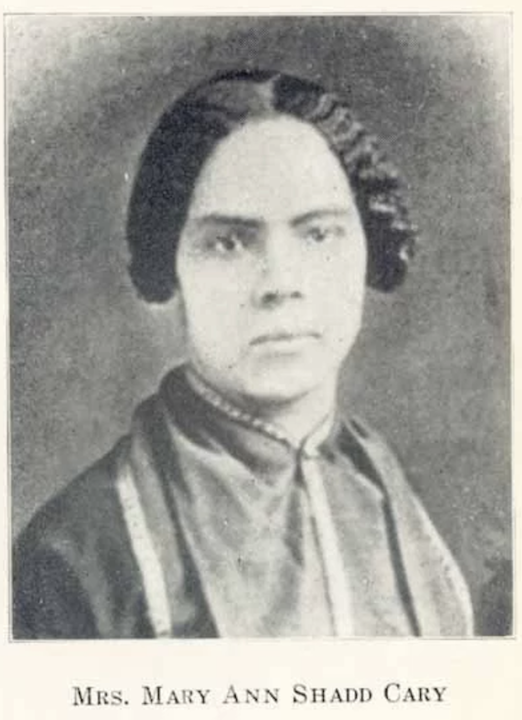
Mary Ann Shadd Cary (1823 – 1893): When the Fugitive Slave Act was passed in 1850, threatening not only to capture enslaved people seeking freedom but also freeborn African Americans, Mary Ann Shadd and her brother moved to Windsor, Ontario.
There, she opened a racially integrated school and started an influential newspaper, The Provincial Freeman, making her the first Black woman publisher in all of North America, and the first woman publisher of any background in Canada.
Later in her life, after the Civil War, she moved back to the U.S. and earned a law degree, making her the second African American woman to do so.
. . . . . . . . .
Gertrude Bustill Mossell
Gertrude Bustill Mossell (1855 – 1948): Coming from a family of activists and abolitionists, Mossell started her career in 1855 as the women’s editor of the legendary Black newspaper, the New York Age.
From there she went on write for the Indianapolis World. She was a staunch advocate for black newspapers, and encouraged other women, especially Black women, to enter the field of journalism. She also wrote an influential book titled The Work of Afro-American Woman (1894) to honor the contributions of Black women to various fields.
. . . . . . . . .
Ida B. Wells
Ida B. Wells (also known as Ida B. Wells Barnett, 1862 – 1931): Journalist, feminist, editor, and sociologist Ida Wells was a leader in the early Civil Rights movement. She was best known for spearheading a national anti-lynching campaign, working tirelessly to end the uniquely American practice of public mob murders of African Americans.
Wells’s reputation only grew after her death. There have been journalistic awards established in her name, scholarships in her honor, and even a museum celebrating her legacy in Holly Springs, Mississippi, her hometown.
. . . . . . . . .
Delilah Beasley

Delilah Leontium Beasley (1867 – 1934) wrote a column for the Oakland (CA) Tribune, making her the first African American woman to be a regular contributor to a major newspaper. Before that, she wrote for The Cleveland Gazette, a Black newspaper. Her career as a journalist, spanning over five decades, highlighted social activities and achievements as well as political struggles of Black communities. In addition to her newspaper work, she was the author of a well-received book, The Negro Trail-Blazers of California (1919).
. . . . . . . . .
Alice Dunbar-Nelson

Alice Dunbar-Nelson (1875 – 1935): As a journalist and essayist, Alice Dunbar-Nelson wrote extensively on Civil Rights and women’s issues in the 1920s and 1930s. She was especially interested in the challenges of Black women in education and the workforce.
On a personal level, Dunbar-Nelson wrote of the hardships of growing up mixed-race in Louisiana; these essays were often rejected as “not marketable.” She was equally known as a poet of the Harlem Renaissance era.
. . . . . . . . .
Marvel Jackson Cooke

Marvel Jackson Cooke (1903 – 2000): In addition to making her mark in journalism, Cooke made significant contributions to the labor and Civil Rights movements. She started her career as an assistant to W.E.B. DuBois at the NAACP’s Crisis magazine in the 1920s.
In 1950, she was hired by The Daily Compass, to become the first Black woman reporter for a mainstream white-owned newspaper (she was also the only woman on staff at the time). Cooke started the NYC chapter of the labor union that protected the rights of newspaper journalists.
. . . . . . . . .
Alice Allison Dunnigan

Alice Allison Dunnigan (1906–1983): This daughter of Kentucky sharecroppers pioneered many “firsts” for Black journalists. She was the first Black woman …
- correspondent to receive White House credentials
- member of the U.S. Senate and House of Representatives press galleries.
- to cover a presidential campaign (Harry S. Truman’s in 1948)
While reporting on Jim Crow issues, Dunnigan often experienced them herself. President Eisenhower feared her tough, forthright questions at his press briefings and pointedly avoided calling on her. John F. Kennedy changed that; he even appointed her to a position in his new administration, another first.
. . . . . . . . .
Ethel Payne
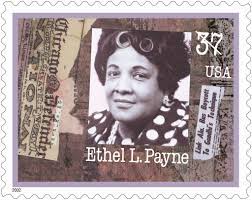
Photo: Bettmann/CORBIS
Ethel Payne (1911 – 1991): Known as the “First Lady of the Black Press,” Ethel Payne was another journalist who was in equal measure an activist. She was one of the leading chroniclers of the Civil Rights Movement of the 1950s and 1960s.
When CBS hired her in 1972, she became the first female African American commentator on a national network, covering politics both at home and abroad. She was known for asking tough questions of politicians that others didn’t dare ask.
. . . . . . . . .
Daisy Bates
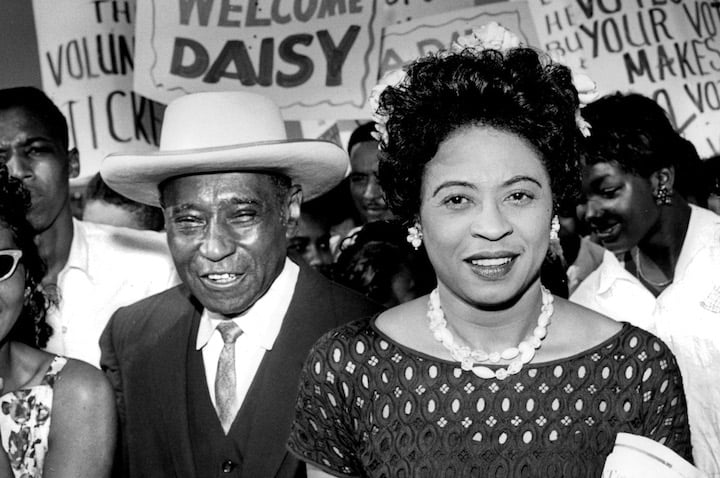
Daisy Bates (1914 – 1999), born Daisy Lee Gatson in Huttig, Kansas, endured a traumatic childhood. Her mother was murdered by three white men, and later, she was abandoned by her father. Raised by family friends, she learned to navigate life on her own terms.
In the early 1940s, she and her husband Christopher Bates started a weekly Black newspaper, the Arkansas State Press. At the same time, Daisy Bates became deeply involved in the civil rights movement, becoming the president of the Arkansas chapter of the NAACP in the early 1950s.
In 1954, the Supreme Court case Brown v Board of Education ruled that school segregation was unconstitutional. But the decades-long struggle was far from over. As a journalist, newspaper publisher, and activist, Bates played a part in seeing that fight through.
In 1957, she helped a group of African-American students, known as the Little Rock Nine, attend an all-white high school. Daisy Bates has been honored for her role in the battle for school integration as well as her many contributions to the Black press.
. . . . . . . . .
Evelyn Cunningham
Evelyn Cunningham (1916 – 2010): For her coverage of the early Civil Rights movement a for the legendary Black newspaper, The Pittsburgh Courier, Cunningham received major awards as both a reporter and an editor.
Her tireless reporting on Southern lynchings earned her the title “the lynching editor.” She also conducted in-depth interviews with Civil Rights leaders, including Dr. Martin Luther King, Jr. and Malcolm X.
. . . . . . . . .
Nancy Hicks Maynard
Nancy Hicks Maynard (1946 – 2008): As a journalist and publisher, Nancy Hicks Maynard achieved a great deal in a short life. She was the first Black female reporter for the New York Times.
In 1983, she and her husband purchased The Oakland Tribune, making it the only Black-owned major metropolitan newspaper in the country, and bringing diversity to its newsroom. The couple also co-founded of the Maynard Institute for Journalism Education.
. . . . . . . . .
Gwen Ifill

Gwen Ifill (1955–2016) was the daughter of immigrants from Barbados, who grew up in Queens, New York. One of Gwen’s first positions was as White House correspondent for the New York Times. She broke into television news in 1994 when she became the Capitol Hill reporter for NBC’s news division.
In 1999, Gwen began hosting Washington Week in Review, becoming the first Black woman to host a national public-affairs television program. Later, she and Judy Woodruff co-hosted the PBS NewsHour.
Gwen moderated the 2004 and 2008 American vice-presidential debates and won numerous awards for her work as a TV newscaster and journalist. In one of her last on-air appearances, Gwen and Judy Woodruff moderated the presidential debate between Hillary Clinton and Bernie Sanders. Sadly, Gwen died of cancer later that year. For someone who barely made it past her 61st birthday, she left a rich and lasting legacy.
You might also enjoy:
- Renaissance Women: 12 Female Writers of the Harlem Renaissance
- 6 Female Journalists of the World War II Era
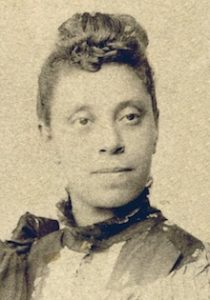


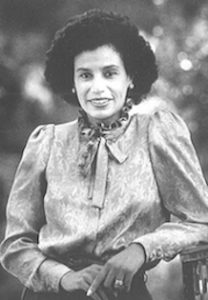
Is it possible to get a copy of this article to share with the Zora Neale Reading group I belong to without the Ads? Thanks Suzy Peers 10 Pioneering African-American Women Journalists By Nava Atlas | On November 4, 2017 | Comments (0)
Suzy, I can make a pdf of this article and e-mail it to you. I’ll do that now! If by some chance you don’t get it within the next 15 minutes or so, or if you prefer a different e-mail address, please contact me via the site’s contact form: https://www.literaryladiesguide.com/contact/